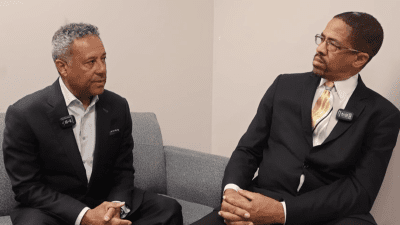Historically Black Colleges and Universities (HBCUs) are reinventing themselves as catalysts for technological innovation and entrepreneurship, creating pathways to success for African American students in an increasingly digital economy.
These institutions, while representing just 3% of U.S. colleges and universities, produce 20% of Black graduates and 25% of African American STEM degree holders. Now they’re leveraging this educational foundation to build robust innovation ecosystems that nurture the next generation of Black tech founders and business leaders.
From education to innovation
The transformation of HBCUs into innovation powerhouses didn’t happen overnight. Despite historical underfunding, these institutions have cultivated environments that develop talent and resilience in their students. In recent years, many HBCUs have established dedicated innovation hubs, spaces specifically designed to support entrepreneurship, technology development and startup incubation.
These centers provide crucial resources often unavailable to minority entrepreneurs, including mentorship, funding opportunities, technical training and industry connections. By creating these supportive ecosystems, HBCUs are addressing the persistent opportunity gap in entrepreneurial spaces where Black founders remain significantly underrepresented.
A major catalyst for this movement has been the CHIPS and Science Act of 2022, which authorized the U.S. Economic Development Administration to fund Regional Technology and Innovation Hubs. In July 2024, the EDA announced $504 million for 12 Tech Hubs, with several involving HBCUs to promote inclusive, tech-driven economic growth.
The Birmingham Biotechnology Hub, for instance, includes a multi-HBCU workforce training collaboration focused on developing micro-credentials and experiential learning opportunities in biotechnology. The program aims to place graduates directly into high-quality jobs within the burgeoning biotech industry.
3 flagship innovation programs driving change
HBCU innovation hubs have proliferated across the country, with several standout programs demonstrating remarkable success:
The HBCU Founders Initiative has emerged as a leading force in this transformation. This nonprofit supports over 1,200 students and alumni from more than 80 HBCUs. In August 2024, HBCUFI announced a strategic partnership with Microsoft and the Walton Family Foundation to expand its pre-accelerator program to 15 HBCUs, including five new institutions. The eight-week program offers hybrid workshops, design thinking training and pitch competitions, helping founders secure over $2 million for their startups. Program leaders emphasize that HBCUFI provides access to resources typically available only at Ivy League institutions, such as venture capital programming and professional mentorship.
The Propel Center, launched in 2021 with substantial support from Apple and the Southern Company, serves as another cornerstone of the HBCU innovation ecosystem. Based in Atlanta, this virtual and physical hub connects students and faculty from over 100 HBCUs to cutting-edge training in artificial intelligence, app development, cybersecurity and entrepreneurship. In 2024, the Propel Center introduced its “Future Proof Entrepreneurship” micro-credential course, equipping students with practical skills to launch ventures. The center also established an Arts & Entertainment Industry Accelerator, backed by Apple’s Racial Equity and Justice Initiative, providing mentorship to prepare students for leadership in creative industries. The Propel Center’s digital platform ensures accessibility, allowing students to engage from any campus or remote location.
The HBCU Innovation Experience in Alabama represents a state-level approach to fostering tech talent. This collaboration between The Alabama Collective and Innovate Alabama supports all 14 of the state’s HBCUs. Since its inception, the program has introduced over 1,000 students and faculty to technology and entrepreneurship through coding workshops, app design competitions and internships. In March 2025, the initiative’s Innovation Power Hours tour visited Drake State Community and Technical College, offering students hands-on app development training and AI workshops. The top 10 app submissions from Alabama’s HBCUs will compete in a $17,000 pitch competition in Montgomery, fostering a pipeline of Black innovators across the state.
Federal funding and corporate partnerships fuel growth
The expansion of HBCU innovation hubs relies heavily on strategic support from both government agencies and private industry partners.
Federal funding has been pivotal in this growth. The National Science Foundation’s Historically Black Colleges and Universities – Undergraduate Program supports STEM education and research at HBCUs nationwide. Central State University, for example, used HBCU-UP funding to develop an interdisciplinary forensic studies minor, integrating chemistry and social sciences to enhance diversity in the criminal justice workforce.
The NSF’s Technology, Innovation, and Partnerships Directorate, created under the CHIPS Act, further expands funding opportunities for HBCUs, supporting technology development and workforce training in critical areas like artificial intelligence and biotechnology.
Major technology companies have also recognized the potential of HBCU innovation hubs. Apple’s partnership with the Propel Center provides curriculum development, mentorship opportunities and internship placements, creating direct pathways to industry careers. Microsoft’s collaboration with HBCUFI enhances access to technological resources for aspiring entrepreneurs, while the Walton Family Foundation’s financial support enables the program to scale its impact across additional campuses.
These partnerships align with the White House’s 2025 initiative to promote HBCU excellence, which emphasizes public-private collaborations to foster innovation and research in historically underserved academic communities.
Community impact and economic transformation
HBCU innovation hubs are generating transformative outcomes for African American students and their communities. By offering culturally relevant environments, these programs empower students to explore entrepreneurship without the barriers often encountered in predominantly white startup ecosystems.
HBCUFI’s focus on tech-enabled solutions addresses wealth gap issues, including access to healthcare and financial services. The Propel Center’s emphasis on career readiness ensures graduates are equipped for high-demand industries, while the Alabama Collective’s internships have increased HBCU student participation in tech fields by 125% since 2024.
The economic impact of these initiatives extends beyond campus boundaries. HBCUFI-supported founders have raised millions in funding, creating jobs and generating wealth in historically underserved communities. According to industry observers, HBCU innovation hubs make visible the entrepreneurial potential of Black students, challenging conventional perspectives on who leads in technology and innovation sectors.
As one Microsoft executive notes, universities function as learning laboratories where ideas transform into innovations that address community challenges, a principle that HBCUs are putting into practice through their growing innovation ecosystems.
Challenges and future directions
Despite remarkable progress, HBCU innovation hubs continue to face significant challenges. Many operate with limited funding compared to their counterparts at predominantly white institutions, and some struggle to develop the extensive industry networks needed to fully support student entrepreneurs.
The White House’s 2025 HBCU initiative aims to address these disparities by improving access to federal funding and enhancing competitiveness for research grants. Expanding partnerships with global firms and increasing venture capital access for Black founders remain critical goals for sustaining the momentum of these innovation ecosystems.
Looking ahead, HBCUs are positioned to lead in emerging technological fields. The United Negro College Fund’s HBCU Innovation Summit, which has introduced over 300 computer science and engineering students to Silicon Valley since 2013, continues to build pipelines connecting Black talent to technology giants.
Programs like the HBCU Making and Innovation Initiative by the American Association for the Advancement of Science encourage students to tackle United Nations Sustainable Development Goals, fostering global impact through locally-developed solutions.
HBCU innovation hubs stand at the forefront of cultivating African American entrepreneurs, leveraging federal and industry support to create inclusive ecosystems. By addressing systemic barriers and amplifying Black talent, these centers are not merely transforming HBCU campuses, they are reshaping the innovation economy toward a more equitable future where diverse perspectives drive technological advancement and economic growth.
















